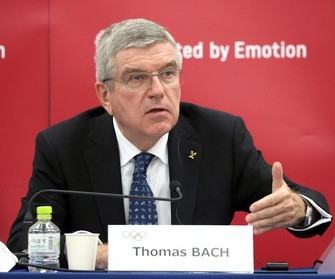Thomas Bach re-elected as IOC president until 2025

GENEVA (AP March 11,) -- Thomas Bach was re-elected as president of the International Olympic Committee on Wednesday for a final four-year term with his immediate focus on this year's delayed Tokyo Games.
The German lawyer was unopposed and won the vote 93-1, with four members abstaining, following an opening eight-year mandate dominated by the Russian doping scandal and the first Olympics to be postponed in peacetime.
"Thank you very much from the bottom of my heart for this overwhelming vote of confidence and trust," Bach said during an online meeting of IOC members.
Bach said Tokyo was "the best prepared Olympic city ever" and reiterated the games would open on July 23 despite restrictions imposed during the COVID-19 pandemic.
"The question is not whether, the question is how these Olympic Games will take place," he said.
Because of the pandemic, Bach spoke to a wall of screens connecting members online instead of at a meeting scheduled for June in Athens.
Bach's presidency has been through problems before, however.
"Let us not forget the sea of troubles we had to navigate since 2014," Bach said, noting the year of the Sochi Games, which were tainted by Russia's state-backed doping program.
Russian teams and athletes have been barred from competing under their nation's name or flag in Tokyo as the latest punishment in fallout from the scandal.
Despite postponement costs for the Tokyo Games, Bach secured the IOC's long-term future by extending key broadcasting and sponsor deals through 2032.
He also signed future Olympic hosts Paris and Los Angeles, while Brisbane is now being fast-tracked for 2032 -- a move aimed at avoiding expensive campaigns and allegations of vote-buying.
Here are some key issues in Bach's presidency:
SUMMER GAMES
The Summer Games is the Olympics for most sports fans, and it has given the Bach-run IOC serious challenges and its most radical decisions.
The 2016 Rio Games were financially and logistically chaotic -- "on the brink before and during," Bach said Wednesday.
Tokyo joined Rio by overspending its budget targets, even before the pandemic. Both hosting votes, before Bach became president, are tainted by ongoing criminal investigations in Brazil and France.
Bach, however, has protected the Olympics' future by ending contested campaigns and votes. Subsequent hosts are also being steered away from spending on new venues.
The future is also in youth-focused, gender neutral events in cheap, urban venues: 3-on-3 basketball, skateboarding, sports climbing, breakdancing. Virtual sports could follow.
OLYMPIC DEMOCRACY
Decision-making is tightly controlled in Bach's hands-on and well-run administration.
Members drawn from sports leaders, businessmen and royal families, including the Qatari emir and a British princess, can seem to be rubber-stamping new proposals with little public debate. Big subjects filter through hand-picked working groups and summits that reach conclusions expected at the outset.
Rare dissent from active athletes elected as IOC members has not been welcomed. Meanwhile, an influential and long-time Bach ally, Sheikh Ahmad al-Fahad al-Sabah of Kuwait, was allowed to "self-suspend" after being indicted in Switzerland for forgery.
A German athlete group this week noted a "legitimacy problem and the democratic deficit of the IOC leadership," and called for reducing a "concentration of power."
ATHLETE ACTIVISM
The IOC has faced sustained challenges to rules limiting athletes' ability to promote themselves and protest at the Olympics.
The power of sports governing bodies has also been challenged in legal cases by speedskaters in Brussels and swimmers in California.
Olympic champion swimmer Kirsty Coventry represents athletes on the IOC executive board, but her views mostly align with leadership.
A challenge for Bach will be handling criticism of China's treatment of its Uyghur people, an issue that has led to the 2022 Beijing Olympics being called the "Genocide Games."



